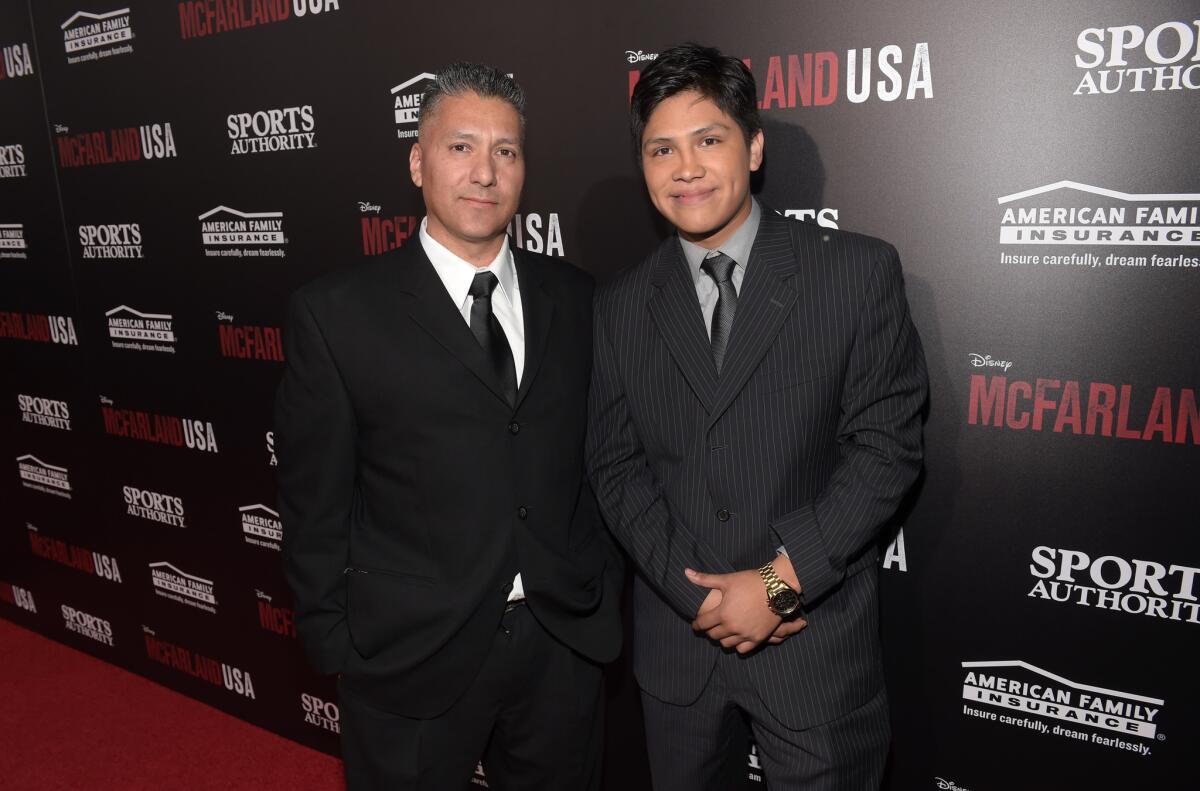‘McFarland, USA’ film revives long-buried memory for runner

- Share via
I knew a movie involving one of the biggest disappointments in my youth might be made someday. Still, my heart began to sink when a screening of “McFarland, USA” rolled around to its climax.
At a cross-country race almost 30 years ago, the gun sounds and the seven boys from McFarland High burst across the starting line amid a stampede of runners from around the state.
The actor playing me takes off too fast and begins to fade halfway through the three-mile course. After three runners from McFarland cross the finish line, they peer back, searching for me, their usual fourth man, but I had fallen deep into the pack.
All season we had dreamed of winning California’s first high school cross-country state championship. But by going out so fast, I had endangered our dream. It took one of our usually slower runners to sprint mightily down the stretch. He took my place, and McFarland miraculously still won.
The dream came true for them, but not me.
“I told you we would win with or without you,” our coach, Jim White, told me on the bus ride home from Fresno. It was a dismal day for me at Woodward Park, Nov. 28, 1987.
Ten years later, I was a reporter at this newspaper when a movie company purchased the rights to an article about McFarland, a small, poor and predominantly Mexican American town in the farming heartland, going for an unprecedented sixth straight state championship.
But watching the low point in my young life exposed in a Hollywood film reopened a bitter memory I had tucked away long ago with my running shoes.
In real life, I consoled myself by reasoning that even though my place had not counted in the state championship, I had been the fourth man on a team that had won a dozen or so “invitational” races that year, some harder than the state meet.
But I found no mitigation for my pain in the movie, which portrays the team as an upstart group of runners who start out losing races but improve quickly to win the state championship.
The inspirational message of the movie is essentially true.
Our coach, played by Kevin Costner, built a sports powerhouse largely with the children of farmworkers in a lackluster part of the state. His teams won nine championships in 14 years. Many of us found our way to college and livelihoods away from the fields.
But like any movie based or inspired by a true story, not everything in “McFarland, USA” is literally true.
The scenes of the state race are the most prominent for Johnny Ortiz, the actor playing me. In the rest of the movie, he takes a back seat to the actors portraying the runners who performed better at the race.
For me, the story of the championship year and a path to a better life started in middle school. Mr. White was our physical education teacher, and that’s when he first encouraged us to run cross-country.
I lived in a dilapidated one-bedroom house across the street from my church with a couple older brothers who worked in the fields. McFarland was a more balanced community of Latino and white residents then. Besides Mr. White, other good-hearted adults looked after the town’s needy youth.
Jim Price, a janitor at the high school, let me live with his family. And Rita Peebles, a cook in the cafeteria, slipped five bucks into my pocket before every away meet so I wouldn’t go hungry when the bus stopped at McDonald’s.
I ran track in the spring of my freshman and sophomore years but played football in the fall. Which is why, when Mr. White was trying to persuade me to switch to cross-country for my junior year, he jokingly told me that they would win the inaugural state championship “with or without you.”
Who knew?
In the movie — and reality — McFarland did barely win state when our usual sixth man, Danny Diaz, whose place in races had not counted all season, moved up to fifth, the last runner whose place counts.
Disney Pictures can thank me, I guess, for creating some true drama.
To this day, I don’t know why I went out uncharacteristically fast. If I had run as well as I did the previous week on the same course when we won the regional championship, the state race would not have been a nail-biter. We would have crushed the team that finished second.
After high school graduation I went to junior college half an hour up Highway 99 and continued running. Then I transferred to Humboldt State. I began to lose track of my teammates and my town. I haven’t been through McFarland in at least 15 years.
Two of us were absent when Disney spent two weeks on location and filmed the rest of my teammates going for a jog in the fields where we used to train. Short captions for each of them at the end of the movie say they became college graduates, teachers, cops and mentors to kids in town.
The state championship aside, “McFarland, USA” suggests my teammates became winners in life. And by that measure, maybe I can let go for good the sour memory of the state race. A caption says what became of me, a sort of champ in my own life too, I guess.
Cardenas, a staff sergeant in the Army, lives in Virginia Beach, Va., with his wife and daughter.
More to Read
Only good movies
Get the Indie Focus newsletter, Mark Olsen's weekly guide to the world of cinema.
You may occasionally receive promotional content from the Los Angeles Times.










